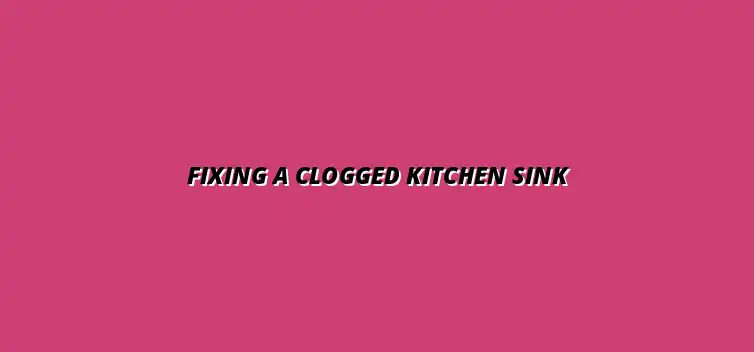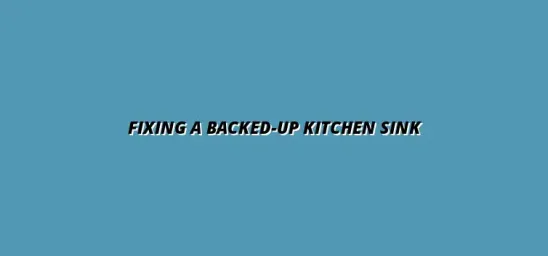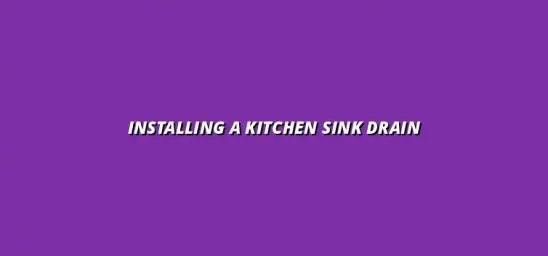
Fixing a Clogged Kitchen Sink
Understanding Clogged Kitchen Sink Drains: Causes and Symptoms
Clogged kitchen sink drains can turn your cooking space into a frustrating zone. Understanding the common causes and symptoms of clogs can help you tackle these issues before they escalate. Here, I’ll break down the main reasons your sink might be experiencing problems and what signs to look for that indicate a clog is forming.
Common Causes of Clogged Kitchen Sink Drains
It’s important to be aware of what can lead to a clogged kitchen sink. The following are some of the most prevalent causes:
- Accumulation of Food Debris: Leftover food particles can accumulate in your drain, forming a sticky mass that prevents water from flowing.
- Grease Buildup and Its Effects: When cooking oils and fats are poured down the sink, they can harden and trap food particles.
- Foreign Objects and Blockages: Items like utensils, bottle caps, or other debris can accidentally find their way into the sink, causing instant clogs.
Accumulation of Food Debris
Food debris is one of the top culprits behind clogged drains. When you wash dishes, tiny bits of food can slip down the drain. Over time, even small amounts can build up, leading to a significant blockage. Regularly scraping plates before washing can help minimize this issue!
Grease Buildup and Its Effects
Have you ever poured grease down the sink? It might seem harmless, but over time, grease can accumulate and solidify. This hardening process creates a sticky barrier that can trap more debris, making it essential to keep fats out of the drain.
Foreign Objects and Blockages
Sometimes, foreign objects may accidentally fall into the sink. Items like small utensils or food packaging can lead to immediate clogs. If you ever notice a sudden slowdown in drainage, it might be time to check for these hidden blockages.
Identifying Signs of a Clogged Drain
Recognizing the signs of a clogged kitchen sink drain can save you from bigger plumbing headaches down the line. Here are a few things to watch for:
- Slow Drainage: What It Means: If water is taking longer than usual to drain, there may be a buildup.
- Unpleasant Odors: A Warning Sign: Foul smells can indicate food debris or stagnant water.
- Gurgling Sounds: Indications of a Deeper Issue: Gurgling noises can suggest trapped air or a blockage in the pipes.
Slow Drainage: What It Means
If you notice that water is pooling in your sink, it’s a classic sign of a clog. Slow drainage means that something is obstructing the flow, and addressing it quickly can save you from a bigger mess later on.
Unpleasant Odors: A Warning Sign
Ever caught a whiff of something foul coming from your sink? That odor usually means food particles are rotting in the pipes. It’s an immediate sign that you should take action to clear the drain!
Gurgling Sounds: Indications of a Deeper Issue
Strange gurgling sounds can be alarming! They often mean that air is struggling to escape through a clog, and it’s a strong signal that your plumbing needs attention. Listening closely to your sink can help catch issues early!
Preventing Future Clogs in Kitchen Sink Drains
To keep your kitchen sink running smoothly, it's essential to establish a routine for maintenance. I've found that a little bit of care goes a long way in preventing future clogs. By incorporating simple practices into your daily or weekly routine, you can greatly reduce the chances of dealing with annoying plumbing issues down the line!
In my experience, regular cleaning is key. Not only does it help to keep your sink looking fresh, but it also aids in identifying potential problems before they escalate. So, let’s dive into some effective routine maintenance tips for kitchen sinks!
Routine Maintenance Tips for Kitchen Sinks
When it comes to maintaining your kitchen sink, following these practices can make a noticeable difference:
- Clean your sink daily: Wipe down the sink after each use to remove food particles and grease.
- Run hot water regularly: This simple step helps to flush out grease and food debris.
- Use a mixture of vinegar and baking soda: This natural cleaner can help keep your drains fresh and clear.
- Inspect your disposal: If you have a garbage disposal, run it often and keep it clean.
By integrating these practices into your routine, you can help maintain a clean and efficient kitchen sink. Remember that even small actions, like rinsing away food debris, can prevent larger issues!
Regular Cleaning Practices
To ensure your kitchen sink stays in top shape, consider these regular cleaning practices:
- Deep clean weekly: Spend a few minutes each week to scrub the sink with a gentle cleanser.
- Use citrus peels: Running citrus peels through your disposal not only freshens it but also helps break down grease.
- Check for leaks: Regularly inspect under the sink for any signs of leaks or dampness.
These steps will help maintain your sink and prevent buildup that could lead to clogs!
How to Manage Food Waste Properly
Managing food waste effectively is essential for protecting your kitchen sink from clogs. Here are some tips on how to do this:
- Scrape plates before washing: Always scrape excess food into the trash before rinsing dishes.
- Avoid putting fibrous foods down the disposal: Items like celery or corn husks can cause blockages.
- Use a compost bin: Consider composting food scraps instead of washing them down the drain.
By managing food waste wisely, you'll significantly reduce the chances of a clogged sink, keeping your kitchen running smoothly!
Installing Drain Screens and Traps
Another effective way to prevent clogs is by using drain screens and traps. These tools can catch debris before it enters your plumbing system, saving you from future headaches. Let’s explore their benefits and how to choose the right ones!
Benefits of Using Drain Screens
Installing drain screens can provide several benefits:
- Prevents large debris from entering: They act as a barrier against food particles and other waste.
- Easier cleaning: Screens can be easily removed and cleaned, helping to maintain a clog-free drain.
- Cost-effective solution: They are inexpensive and can save you money on plumbing repairs.
Using drain screens is a small investment with great returns in preventing clogs!
How to Choose the Right Drain Trap
When selecting a drain trap, consider the following factors:
- Size: Ensure it fits your sink's drain properly.
- Material: Look for durable materials that resist corrosion.
- Mesh size: Choose a mesh size that effectively catches debris without clogging itself.
By making an informed choice, you can ensure your kitchen sink stays clear of clogs!
Addressing Common Questions about Clogged Kitchen Sink Drains
As a plumber, I often receive questions about kitchen sink maintenance and the best practices to avoid clogs. Here are some common questions and their answers!
What Should Not Be Put Down the Sink?
It’s really important to avoid certain items down your sink to prevent clogs. Here’s a quick list:
- Grease and oils: They can solidify and cause blockages.
- Fibrous vegetables: Foods like celery can wrap around blades in disposals.
- Starchy foods: Items like rice can expand and clog drains.
When to Call a Professional Plumber?
Sometimes, despite our best efforts, we may need a professional. You should consider calling a plumber when:
- Clogs persist: If you've tried DIY methods and nothing works.
- Unusual smells: If you notice foul odors that indicate a plumbing issue.
- Frequent backups: If clogs happen often, there may be a bigger issue.
Are Chemical Drain Cleaners Safe to Use?
While chemical drain cleaners can be effective, they often come with risks. I recommend using them sparingly, as they can:
- Damage pipes: Harsh chemicals can corrode plumbing over time.
- Harm the environment: Many chemicals are toxic and can pollute water systems.
- Not address the root cause: They may provide a temporary fix instead of solving the underlying issue.
Summarizing Solutions and Encouraging Proactive Maintenance
To wrap it all up, keeping your kitchen sink clear of clogs requires a bit of effort, but it’s well worth it! With some regular maintenance and smart practices, you can enjoy a hassle-free kitchen experience.
I encourage everyone to incorporate these techniques into their routine. When we care for our plumbing, we can prevent future issues and create a healthier home environment!





Fixing a Backed-Up Kitchen Sink
Prepare Your Plumbing for Weather
Installing a Kitchen Sink Drain
When to Replace Plumbing Fixtures
Fixing a Jammed Garbage Disposal